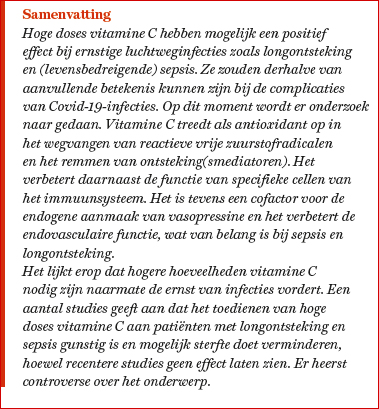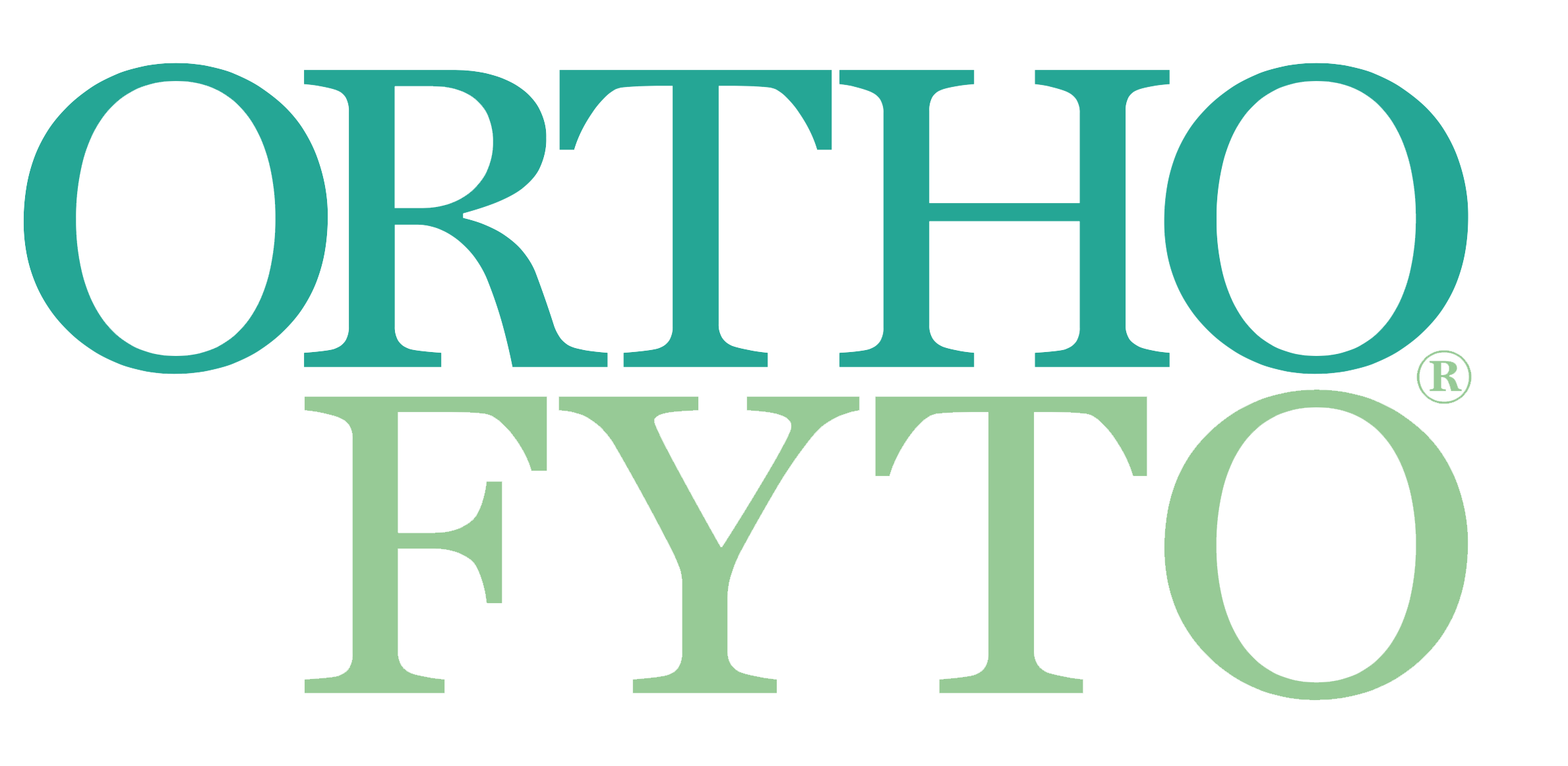Vitamine C in longontsteking en sepsis
05 May, 2020
Door: Fleur Kortekaas
 Over het nut van vitamine C-suppletie bij Covid-19 zijn de meningen zeer verdeeld. Toch zijn in Chinese en Amerikaanse ziekenhuizen opmerkelijke resultaten geboekt met hoge doses vitamine C bij ernstige longontsteking en sepsis. Er zijn inmiddels ook Covid-19-protocollen ontwikkeld voor de inzet van vitamine C.
Over het nut van vitamine C-suppletie bij Covid-19 zijn de meningen zeer verdeeld. Toch zijn in Chinese en Amerikaanse ziekenhuizen opmerkelijke resultaten geboekt met hoge doses vitamine C bij ernstige longontsteking en sepsis. Er zijn inmiddels ook Covid-19-protocollen ontwikkeld voor de inzet van vitamine C.
Profylactische toediening van vitamine C (minstens 200 mg per dag) bij reeds geïnfecteerde (griep)patiënten verminderde de incidentie van longontsteking.2-5 Het lijkt erop dat hoe lager de vitamine C-status is, des te ernstiger de ernst van de longontsteking of ARDS.6,7 Zeker 40% van de patiënten vertoonden vitamine C-deficiëntie (minder dan 11 micromol/L), en die niveaus bleven gedurende vier weken verlaagd.8,9 Uit deze studies blijkt een hoger gebruik van vitamine C, en mogelijk ook een hogere behoefte aan vitamine C gedurende lage luchtweginfecties.
Een eerste rapport van de arts Kenner in 1948 liet zien dat toediening van 2 tot 4 gram vitamine C per dag intraveneus of intramusculair bij patiënten met longontsteking de hoofdpijn, misselijkheid, koorts en cyanose verminderde.10 Orale of intraveneus toegediende vitamine C bleek in onderzoek de ernst van de luchtwegklachten te doen afnemen, met name in de meest zieke patiënten, en de verblijfsduur in het ziekenhuis te verminderen.8,9
Cathart opperde de hypothese dat patiënten met ernstige luchtweginfecties en longontsteking een hogere behoefte aan vitamine C hadden. Hij deed dat op basis van de observatie dat de patiënten vitamine C in de darm verdroegen bij doseringen van 4-15 gram per 24 uur.11 Mochalkin observeerde op basis van het monitoren van vitamine C-niveaus dat 250-800 mg vitamine C per dag onvoldoende was om de initiële vitamine C-status van de patiënt te behouden. Maar 500 tot 1600 mg per dag bleek wél voldoende te zijn.9 Deze niveaus waren niettemin nog steeds te laag (minder dan 50 micromol/L), wat suggereert dat meer dan 1600 mg per dag nodig is om het plasma te verzadigen. Hieruit kan worden afgeleid dat patiënten met ernstige infecties zoals longontsteking een hogere behoefte hebben aan vitamine C en dat toediening van deze dosis leidt tot verbetering van het klinisch verloop van de infectie.1
Lees het gehele artikel vanaf pagina 38 in OrthoFyto 3/20. Wilt u het gehele artikel als PDF bestand ontvangen? Bestel het dan hier voor € 3,50. Bronvermelding:- Carr AC. Vitamin C in pneumonia and sepsis. In: Chen Q, Vissers M, editors. Vitamin C: New Biochemical and Functional Insights. Oxidative Stress and Disease. Boca Raton, FL CRC Press/Taylor & Francis; 2020. p. 115-35. ISBN 9781138337992
- Hemilä, H. and Louhiala, P. 2013. Vitamin C for preventing and treating pneumonia. Cochrane database Syst. Rev. 8, Cd005532.
- Glazebrook, A. J. and Thomson, S. 1942. The administration of vitamin C in a large institution and its effect on general health and resistance to infection. J. Hyg. (Lond.) 42, 1–19.
- Kimbarowski, J. A. and Mokrow, N. J. 1967. Colored precipitation reaction of the urine according to Kimbarowski (FARK) as an index of the effect of ascorbic acid during treatment of viral influenza (English translation: http:// www.mv.helsinki.fi/home/hemila/T4.pdf).Dtsch. Gesundheitsw. 22, 2413–2418.
- Pitt, H. A. and Costrini, A. M. 1979. Vitamin C prophylaxis in marine recruits. JAMA 241, 908–911.
- Bakaev, V. V. and Duntau, A. P. 2004. Ascorbic acid in blood serum of patients with pulmonary tuberculosis and pneumonia. Int. J. Tuberc. Lung Dis. 8, 263–266.
- Chakrabarti, B. and Banerjee, S. 1955. Dehydroascorbic acid level in blood of patients suffering from various infectious diseases. Proc.Soc. Exp. Biol. Med. 88, 581–583.
- Hunt, C., Chakravorty, N. K., Annan, G., Habibzadeh, N. and Schorah, C. J. 1994. The clinical effects of vitamin C supplementation in elderly hospitalised patients with acute respiratory infections. Int. J. Vitam. Nutr. Res. 64, 212–219.
- Mochalkin, N. I. 1970. Ascorbic acid in the complex therapy of acute pneumonia (English translation: http://www.mv.helsinki.fi/home/hemila/T5.pdf). Voen. Med. Zh. 9, 17–21.
- Klenner, F. R. 1948. Virus pneumonia and its treatment with vitamin C. South. Med. Surg. 110, 36–38.
- Cathcart, R. F. 1981. Vitamin C, titrating to bowel tolerance, anascorbemia, and acute induced scurvy. Med. Hypotheses 7, 1359–1376.
- Schorah, C. J., Downing, C., Piripitsi, A., Gallivan, L., Al-Hazaa, A. H., Sanderson, M. J. and Bodenham, A. 1996. Total vitamin C, ascorbic acid, and dehydroascorbic acid concentrations in plasma of critically ill patients. Am. J. Clin. Nutr. 63, 760–765. 38.
- McGregor, G. P. and Biesalski, H. K. 2006. Rationale and impact of vitamin C in clinical nutrition. Curr. Opin. Clin. Nutr. Metab. Care 9, 697–703.
- Carr, A. C., et al 2017. Hypovitaminosis C and vitamin C deficiency in critically ill patients despite recommended enteral and parenteral intakes. Crit. Care. 21, 300.
- Borrelli, E., Roux-Lombard, P., Grau, G. E., Girardin, E., Ricou, B., Dayer, J. and Suter, P. M. 1996. Plasma concentrations of cytokines, their soluble receptors, and antioxidant vitamins can predict the development of multiple organ failure in patients at risk. Crit. Care Med. 24, 392–397.
- Long, C. L., Maull, K. I., Krishnan, R. S., Laws, H. L., Geiger, J. W., Borghesi, L., Franks, W., Lawson, T. C. and Sauberlich, H. E. 2003. Ascorbic acid dynamics in the seriously ill and injured. J. Surg. Res. 109, 144–148.
- Nathens, A. B., Neff, M. J., Jurkovich, G. J.,Klotz, P., Farver, K., Ruzinski, J. T., Radella, F., Garcia, I. and Maier, R. V. 2002. Randomized,prospective trial of antioxidant supplementation in critically ill surgical patients. Ann. Surg. 236, 814–822.
- de Grooth, H. J., Manubulu-Choo, W. P., Zandvliet, A. S., Spoelstra-de Man, A. M. E., Girbes, A. R., Swart, E. L. and Oudemansvan Straaten, H. M. 2018. Vitamin-C pharmacokinetics in critically ill patients: A randomized trial of four intravenous regimens. Chest. 153(6), 1368–1377.
- Collier, B. R., Giladi, A., Dossett, L. A., Dyer, L., Fleming, S. B. and Cotton, B. A. 2008. Impact of high-dose antioxidants on outcomes in acutely injured patients. JPEN J. Parenter. Enteral Nutr. 32, 384–388.
- Berger, M. M., Soguel, L., Shenkin, A., Revelly, J. P., Pinget, C., Baines, M. and Chiolero, R. L. 2008. Influence of early antioxidant supplements on clinical evolution and organ function in critically ill cardiac surgery, major trauma, and subarachnoid hemorrhage patients. Crit. Care 12, R101.
- Giladi, A. M.et al 2011. Highdose antioxidant administration is associated with a reduction in post-injury complications in critically ill trauma patients. Injury 42, 78–82.
- Sandesc, M., Rogobete, A. F., Bedreag, O.H., Dinu, A., Papurica, M., Cradigati, C. A., Sarandan, M. et al. 2018. Analysis of oxidative stress-related markers in critically ill polytrauma patients: An observational prospective singlecenter study. Bosn. J. Basic Med. Sci. 18(2), 191–197.
- Fowler, A. A., Syed, A. A., Knowlson, S.,Sculthorpe, R., Farthing, D., DeWilde, C., Farthing, C. A. et al. 2014. Phase I safety trial of intravenous ascorbic acid in patients with severe sepsis. J. Transl. Med. 12, 32.
- Zabet, M. H., Mohammadi, M., Ramezani,M. and Khalili, H. 2016. Effect of high-dose ascorbic acid on vasopressor’s requirement in septic shock. J. Res. Pharm. Pract. 5, 94–100.
- Nabil Habib, T. and Ahmed, I. 2017. Early adjuvant intravenous vitamin C treatment in septic shock may resolve the vasopressor dependence. Int. J. Microbiol. Adv. Immunol. 05, 77–81.
- Litwak, J. J.,et al . 2019. Vitamin C, hydrocortisone, and thiamine for the treatment of severe sepsis and septic shock: A retrospective analysis of real-world application. J. Clin. Med. 8.
- Shin, T. G., Kim, Y. J., Ryoo, S. M., Hwang, S. Y., Jo, I. J., Chung, S. P., Choi, S. H., Suh, G. J. and Kim, W. Y. 2019. Early vitamin C and thiamine administration to patients with septic shock in emergency departments: Propensity score-based analysis of a before-and-after cohort study. J. Clin. Med. 8.
- Balakrishnan, M.et al. 2018. Hydrocortisone, vitamin C and thiamine for the treatment of sepsis and septic shock following cardiac surgery. Indian J. Anaesth. 62, 934–939.
- Marik, P. E., Khangoora, V., Rivera, R., Hooper, M. H. and Catravas, J. 2017. Hydrocortisone, vitamin C, and thiamine for the treatment of severe sepsis and septic shock: A retrospective before-after study. Chest 151, 1229–1238.
- Fowler, A. A., Truwit, J. D., Hite, R. D., Morris, P. E., Dewilde, C., Priday, A., … Halquist, M. (2019). Effect of Vitamin C Infusion on Organ Failure and Biomarkers of Inflammation and Vascular Injury in Patients with Sepsis and Severe Acute Respiratory Failure: The CITRIS-ALI Randomized Clinical Trial. In JAMA - Journal of the American Medical Association (Vol. 322, pp. 1261–1270). American Medical Association.
- Kashiouris, M. G., L’heureux, M., Cable, C. A., Fisher, B. J., Leichtle, S. W., & Fowler, A. A. (2020, February 1). The emerging role of vitamin C as a treatment for sepsis. Nutrients. MDPI AG.
- Kalil, A. C. (2020, February 4). Lack of Benefit of High-Dose Vitamin C, Thiamine, and Hydrocortisone Combination for Patients with Sepsis. JAMA - Journal of the American Medical Association. American Medical Association.
- Carr, A. C., & Maggini, S. (2017, November 1). Vitamin C and immune function. Nutrients. MDPI AG.
- Manuel, R., Colunga Biancatelli, L., Berrill, M., & Marik, P. E. (2019). Expert Review of Anti-infective Therapy The antiviral properties of vitamin C.
- Vitamin C Infusion for the Treatment of Severe 2019-nCoV Infected Pneumonia - Full Text View - ClinicalTrials.gov. (n.d.). Retrieved April 3, 2020
- Shanghai 2019 comprehensive treatment of coronavirus disease expert consensus Expert Group on Clinical Treatment of New Corona Virus Disease in Shanghai China. Journal of Infectious Diseases, 2020,38: Online Prepublish. DOI: 10.3760/cma.j.issn.1000-6680.2020.0016 [Source document: http://rs.yiigle.com/yufabiao/1183266.htm Translated (direct-literal translation via MS-Translate) by Dr. Paul Anderson 03-24-2020]
- Cheng, R. Z. (2020). Can early and high intravenous dose of vitamin C prevent and treat coronavirus disease 2019 (COVID-19)? Medicine in Drug Discovery, 100028.
- OMNS Editorial Review Board Rationale for Vitamin C Treatment of COVID-19 and Other Viruses. Orthomolecular Medicine News Service, April 3, 2020
- Marik, P. (2020). EVMS CRITICAL CARE COVID-19 MANAGEMENT PROTOCOL Developed and updated by.
- Linus Pauling Institute: lpi.oregonstate.edu/sites/lpi.oregonstate.edu/files/pdf/lpi_vitamin_c_special_statement_on_covid-19.pdf
